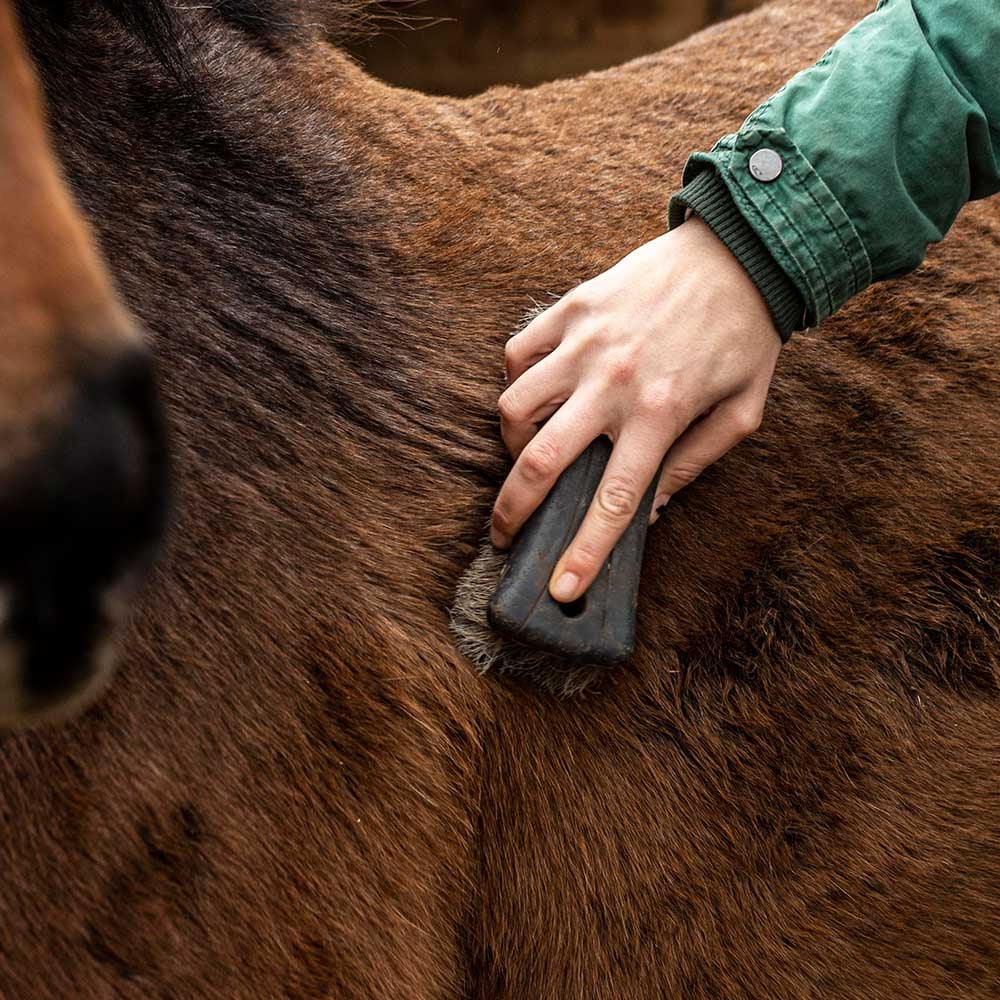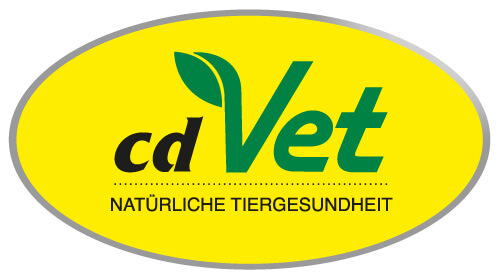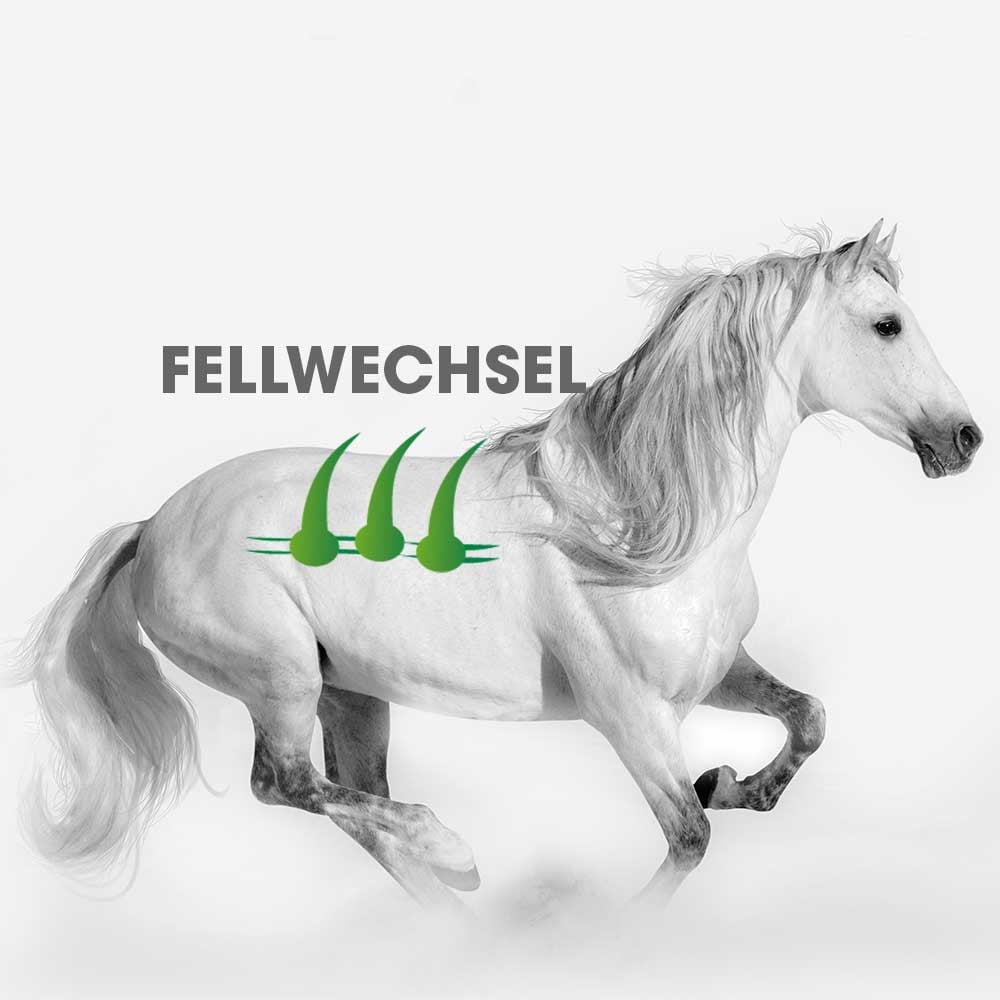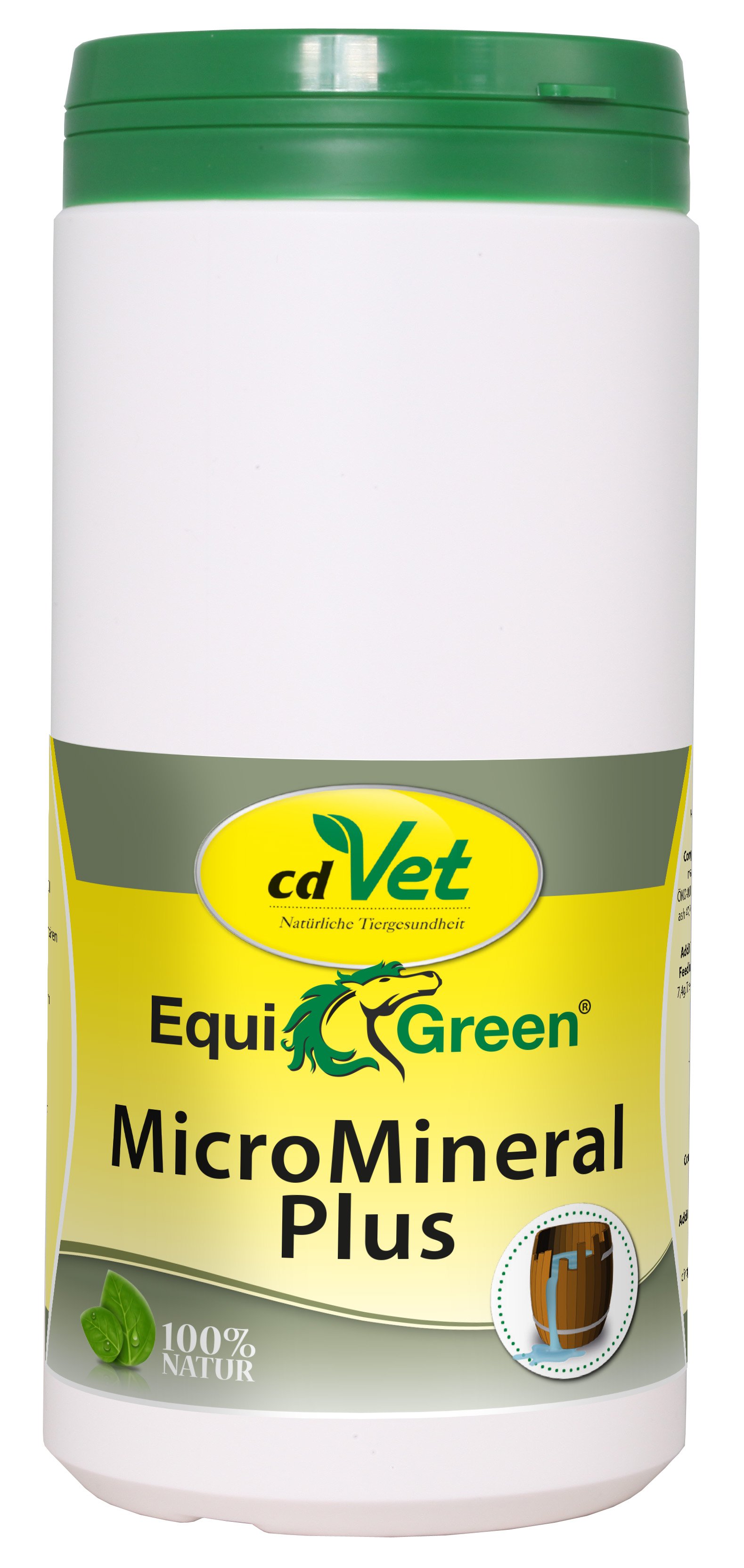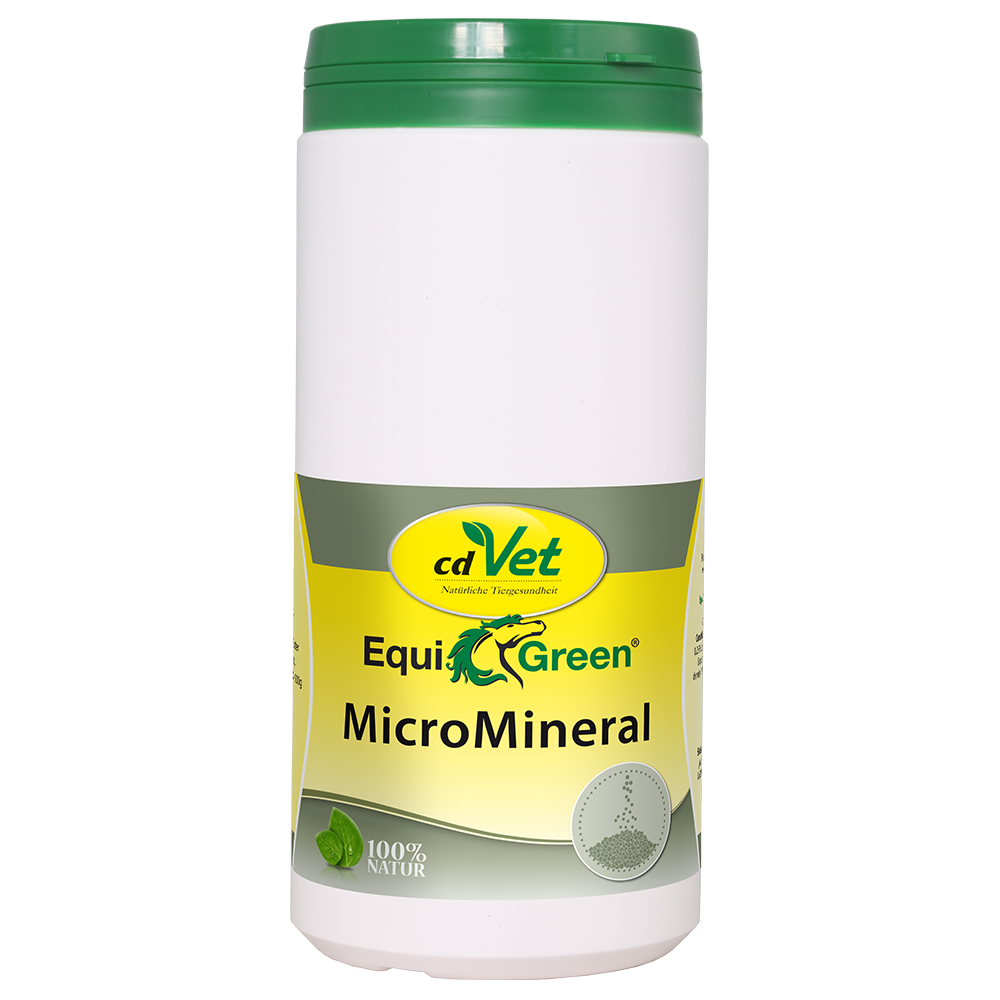The change of coat in the horse
The coat change begins with the first temperature increases in January. Things really start with the first rays of sunshine in March – the duration of daylight brightness plays a crucial role at this time.
The plush winter fur, which protects against icy temperatures, is replaced by the finer, thinner and more air-permeable summer fur. This peak performance of the organism places a lot of demands on the animals' metabolism, as on the one hand the hair has to be shed and on the other hand new hair has to be formed. Optimizing the metabolism and thus its main detoxification organs, the liver and kidneys, can make a decisive contribution to rapid and problem-free coat change.
Detoxification performance
If the liver and kidneys are overloaded with their detoxification capacity, the body will look for other ways to eliminate its toxins. In this case, horses primarily use the skin as a secondary detoxification organ; additional detoxification via the intestines or recurring respiratory infections can also indicate an overload of the main metabolic organs. These connections explain the increased susceptibility to skin disorders such as mud, infections such as coughs and colds or digestive disorders (stool water, diarrhea) during this time.
Feed quality
A healthy diet makes shedding easier. Feed quality is of great importance. Feeding mueslis or pellets with a variety of synthetic vitamins, minerals, lures and flavorings can have a lasting impact on the horse's sensitive organism. Oats, hay or silage contaminated with bacteria or fungi damage the intestinal flora. The immune system of the intestine is stressed and the nutrient reserves for detoxifying the liver decrease. The consequences of feeding with unsuitable or contaminated feed are not immediately apparent. It often takes 1 to several years before the metabolism is impaired and disorders in the skin and respiratory tract become apparent. This usually happens during the shedding period. This problem can be addressed in three ways:
1.Feeding
EquiGreen Natural Power Muesli – in a proven winter mix, also available oat-free!
The cold winter months, combined with the upcoming coat change, place special demands on your horse's nutrition. In the winter months, EquiGreen Natural Power Muesli contains HorseVital, which supports the immune system, and the tried-and-tested cdVet MicroMineral, as well as a composition of high-quality respiratory herbs. cdVet Natural Power meets the high demands that we at cdVet Natural Products place on concentrated feed for the sensitive herbivore horse: easy digestibility directly in the small intestine thanks to high-quality ingredients such as hydrothermally digested grain and the absence of waste products and fillers.
2. Minerals, vitamins, trace elements
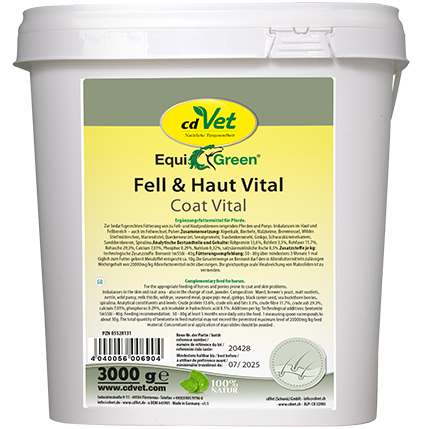
Complementary feed for horsesFor demand-oriented feeding of horses and ponies prone to coat and skin problems. In case of imbalances in the skin and coat area - also in the change of coat, powderEquiGreen Coat & Skin Vital is specially designed to meet the nutritional needs of horses and ponies with skin problems. The optimally digestible blend of selected herbs contains vital substances from purely natural sources that are important for skin metabolism and can be fed to provide nutritional support for coat and skin. The contained herbs provide phytonutrients that are often missing in today‘s feeding. They provide the body with vitamins, minerals, amino acids, and secondary plant metabolism substances, which are readily available and do not further burden the organism and its detoxification organs, which are already strained in these cases. The contained herbs provide phytonutrients that are often missing in today‘s feeding. They provide the body with vitamins, minerals, amino acids, and secondary plant substances, which are readily available and do not further burden the organism and its detoxification organs, which are already strained in these cases. The specially coordinated herbs support the barrier function of the skin. Dry skin with dandruff, hair loss, and itching is supplied with important vital substances and the body‘s own immune system is strengthened. The performance and well-being are thus promoted in a natural way.Expert tip: Proven combination of herbs to support in the change of coat.Composition: maerl, malt rootlets, milk thistle herb, wild pansy herb, couch gras root, stinging nettle herb, brewers‘ yeast cell walls (MOS), brewers´ yeast, grape pips meal, seaweed meal, ginkgo leaves, sea buckthorn berries, black cumin seed, spirulinaAdditives/kg: Technological additives: bentonite (1m558i) 40 g.The total amount of bentonite must not exceed the permitted maximum level in complete feedingstuff of 20000 mg/kg of complete feedingstuff.Analytical constituents: crude protein 13.6%, crude fat 3.3%, crude fiber 11.7%, crude ash 29.3%, ash insoluble in HCl 8.5%, calcium 7.01%, phosphorus 0.29%, natrium 0.32%Feeding recommendation: Add 50-80 g/animal to the feed 1 x daily for at least 3 months. 1 tbsp. corresponds to ca. 8.3 g.The simultaneous oral use with macrolides shall be avoided.
EquiGreen Coat & skin vital
EquiGreen Fur & Skin Vital is a purely natural supplementary feed to intensively support the organism in cases of dull and dry fur, hair breakage and hair loss, dandruff and other skin irritations, which are often the consequences of stress and deficiency situations, as well as exposure to synthetic substances. EquiGreen Fur & Skin Vital consists of special herbs, yeasts, essential fatty acids, micronutrients, trace elements and vitamins that help to compensate for nutritional deficiencies and thus ensure optimal condition of the detoxification organs.
3. Essential fatty acids
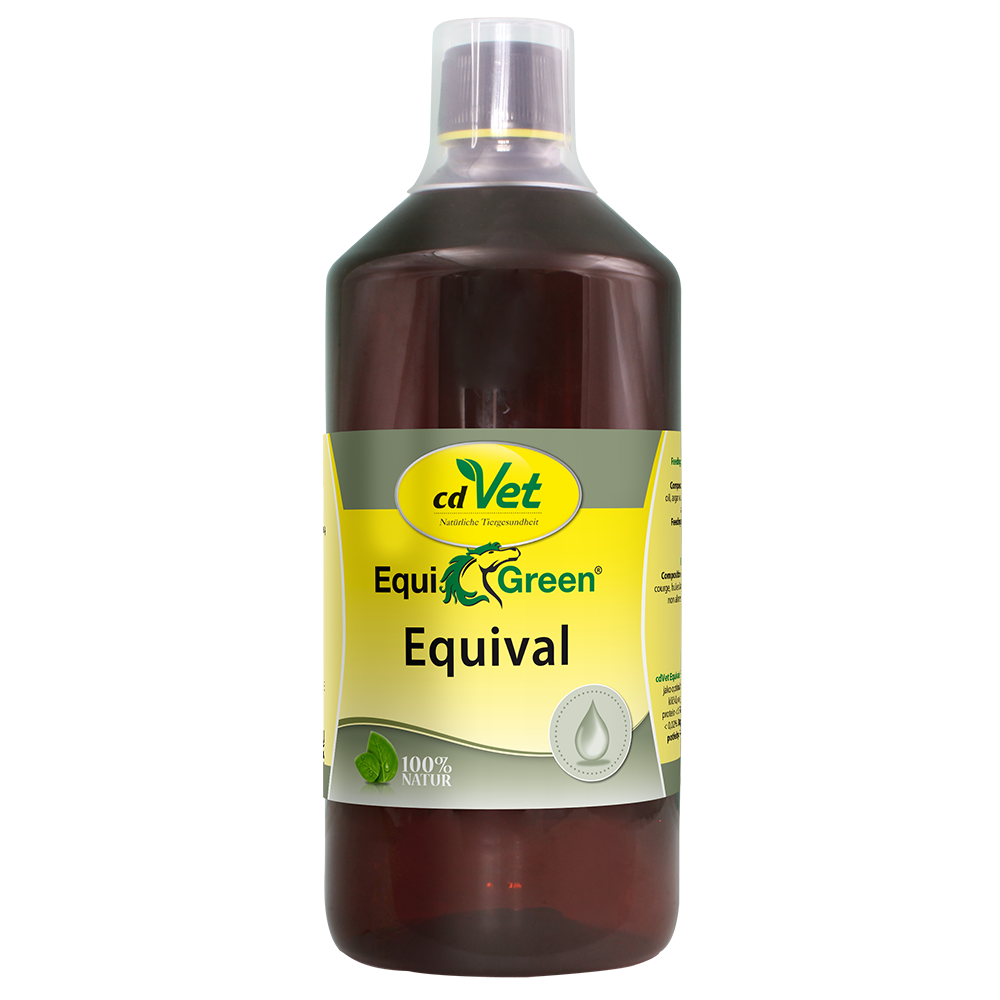
Complementary feed for horsesEquiGreen Equival is a pure natural base oil and primarily intended as an optimal source of energyFeeding oil - with essential fatty acidsEquiGreen Equival is a mixture of high-quality cold-pressed vegetable oils. Cold-pressed food grade linseed oil forms the basis of this purely natural food oil. By the admixed function oils (evening primrose oil, wheat germ oil, pumpkin seed oil and argan oil) optimal, balanced supply is secured with essential fatty acids.Composition: linseed oil, evening primrose oil, wheat germ oil, pumpkin seed oil, argan oil.Analytical constituents: crude protein 0,1%, crude fat 99.6%, crude fiber 0,1%, crude ash 0,1%, sodium 0,02%.Feeding recommendation: as required, ponies: 10-30 ml, horses: 20-60 ml.After opening store in a cool and dark place, and use within 6 weeks!
EquiGreen Equival
Essential fatty acids for shiny fur. On the one hand, oils serve to supply energy. On the other hand, the content of polyunsaturated fatty acids makes them essential, i.e. vital and therefore an important part of horse feeding. A feed supplement with oils, ideally in the form of cold-pressed oils, supports the process of shedding.
They also ensure that the fat-soluble vitamins A and E from the food (e.g. carrots) are better absorbed. EquiGreen Equival is a blend of high-quality cold-pressed vegetable oils. Food-grade cold-pressed linseed oil forms the basis of this purely natural feed oil. The added functional oils (evening primrose oil, wheat germ oil, pumpkin seed oil and argan oil) ensure an optimal, balanced supply of essential fatty acids.
Additional support in old age
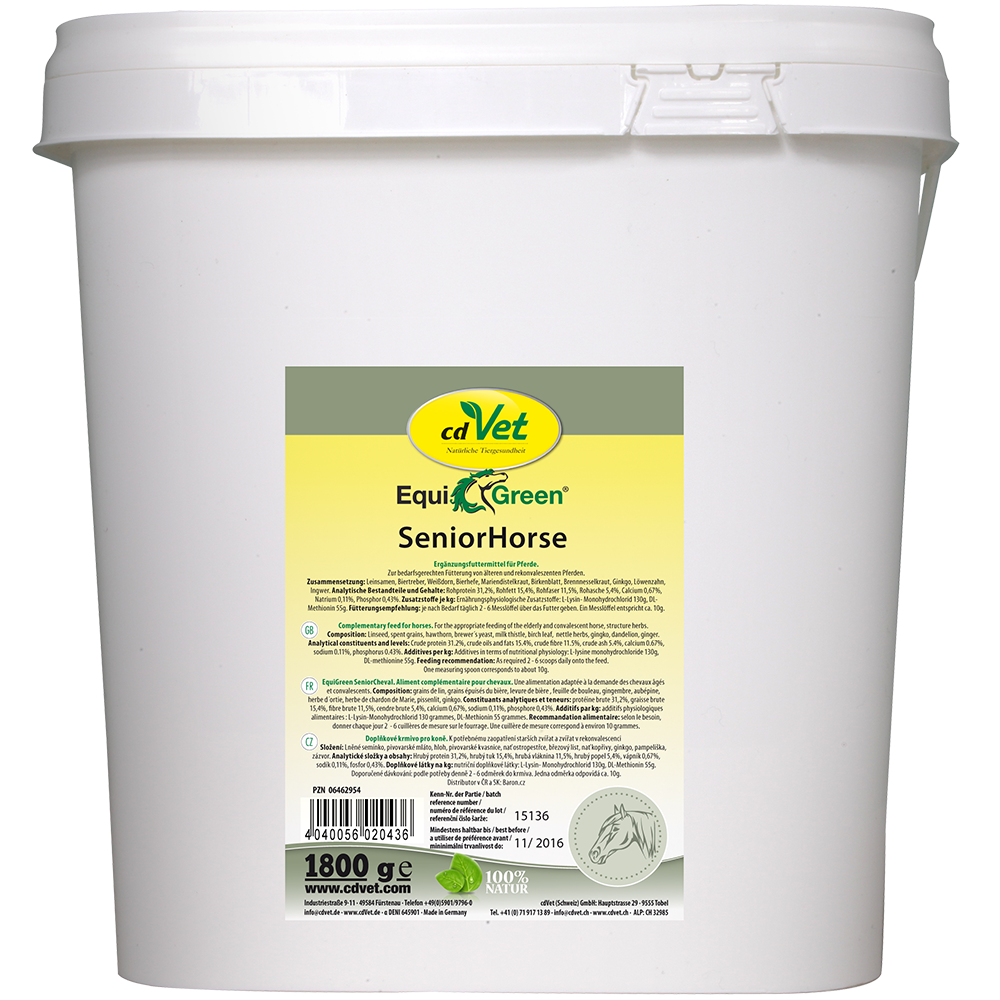
Complementary feed for horsesFor the nutrition-related support at general weakness and in old age, structural herbsEspecially in older horses, the physiological body functions are often weakened. By an optimal supply of vitamins, trace elements, amino acids and selected herbs nutritional deficiencies can be compensated. A balanced diet with optimal basic nutrients, appropriate concentrate intake and the best complementary feed is just as important as the best environmental conditions, as well as a personalized training program.Tip of an expert: As regards the additional micronutrient and mineral supply EquiGreen MicroMineral is recommended.The performance of the horse depends on many factors:- healthy active and passive movement system- healthy internal organs- intact respiratory and circulatory system- functioning digestive tract- balanced temperamentComposition: linseed, brewers‘ grains, hawthorn, brewers´ yeast, milk thistle herb, birch leaf, stinging nettle herb, gingko leaves, dandelion herb, ginger, dandelion root.Additives per kg: Nutritional additives: L-lysine monohydrochloride 102 g, L-methionine (3c305) 55 g.Analytical constituents: crude protein 31.2%, crude fat 15.4%, crude fiber 11.5%, crude ash 5.4%, calcium 0.67%, sodium 0.11%, phosphorus 0.43%.Feeding recommendation: give 10 g/100 kg body weight daily to the feed as required. 1 tbsp. corresponds to approx. 5.5 g.
Content: 1.8 Kilogramm (€28.86 / 1 Kilogramm)
EquiGreen Seniorhorse
Additional support in old age In older animals, shedding may take longer; this is due to the metabolism slowing down with increasing age and is not necessarily pathological. To support our four-legged friends, we recommend additional supplies of EquiGreen SeniorHorse. EquiGreen SeniorHorse is a natural supplementary feed for horses and supplies the animal's body with valuable herbs, vitamin E, selenium, amino acids, electrolytes, essential fatty acids and iron.
EquiGreen SeniorHorse is particularly recommended to compensate for nutritional deficiencies in cases of general weakness, listlessness, after illness or surgery, after training breaks, in cases of lack of agility and in older animals. The older horse can be optimally supported through a balanced combination of hawthorn to support circulation in conjunction with blood circulation-stimulating ginger and gingko.
